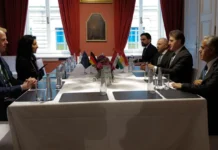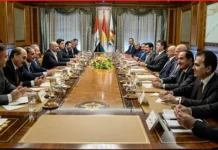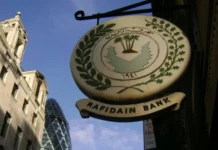Inner Fortress Learn About The “Secret Operations Room” That Monitors The Pulse Of The Iraqi Economy And Protects The Dinar From Fluctuations.
Economy / Special Reports Yesterday, | 629 Baghdad Today – Baghdad While the domestic debate continues regarding the exchange rate and the future of the dinar, the Central Bank of Iraq‘s recent statement on the tasks of its Investment Department has revealed another dimension to the monetary landscape— one that is deeper, less visible, yet highly influential.
This department, which manages foreign reserves and balances global market risks, is now described by economists as the “silent backbone” of the Iraqi economy, alongside oil, and the foundation upon which the most significant financial transformations underway in the country are taking place.
Economic expert Nasser al-Tamimi confirmed to Baghdad Today that the department has transformed in recent years from a traditional bureaucratic unit into a true center of gravity, preserving the stability of public finances and defining the Central Bank’s room for maneuver in the foreign exchange market.
He told Baghdad Today that the prudent management of foreign assets—from government bonds to gold, deposits, and low-risk instruments— has enabled Iraq to weather the waves of global market turmoil and mitigated the impact on the dinar and the country’s financial balance.
The Central Bank‘s technical statement, while employing specialized language regarding balances, transfers, and investment plans, nonetheless attracted the attention of international experts who analyzed its implicit messages.
Bankers point out that the Central Bank’s explicit declaration that the department’s activities aim to stabilize the exchange rate does not necessarily mean an immediate appreciation of the dinar.
However, it is a strong indication that preparations for a stable monetary reform have effectively begun.
These experts believe the Central Bank is waiting for the “safest moment” to take any significant steps, given the extreme sensitivity of the Iraqi market.
Any adjustment to the exchange rate system— whether an appreciation or a restructuring— requires a robust structure capable of absorbing shocks.
At the heart of this shift, two phrases in the Central Bank’s statement caught the attention of experts:
“operational continuity” and “risks associated with oil revenue currencies.”
These are phrases typically used in international contexts related to deep monetary reforms and preparing for potential fluctuations that may accompany opening up to global markets.
Specialists interpret this as part of restructuring Iraq’s financial sector infrastructure in line with IMF recommendations, the requirements for joining the World Trade Organization, and gradual integration into the global financial system.
However, the most sensitive transformation is not limited to the investment sector alone, but encompasses an entire system being developed in parallel.
Starting Saturday (November 22), all cross-border payments in Iraq will transition to the ISO 20022 standard, the system adopted by the most advanced economies.
Furthermore, all banks in Iraq have been mandated to finalize their capital plans according to the ICAAP model and undergo rigorous stress tests to demonstrate their ability to withstand exchange rate fluctuations of up to 30%, a collapse in oil prices, or a sudden run on deposits, while maintaining their solvency.
Economists believe these two steps are not merely technical updates,but rather represent—quite literally—the final two key conditions that the International Monetary Fund, the US Treasury Department, the Bank for International Settlements, and major correspondent banks in New York and London stipulated must be met before Iraq could fully participate in the international foreign exchange market.
They emphasize that the fundamental problem with the dinar today is not its market value, but rather that Iraq remains “blocked” from the global exchange market, and that adopting Basel III-ICAAP and ISO 20022 standards is what will pave the way for gradually lifting this blockade.
Analyses indicate that the Iraqi dinar remains trapped in a restricted market, unable to be traded in large quantities except through the daily dollar auction.
Furthermore, prior to adhering to the new standards, local banks appeared structurally unstable to international banks, and their payment channels relied on outdated SWIFT systems dating back three decades, placing them under suspicion of money laundering.
Now, with banks required to disclose their actual capacity to absorb shocks, the pretext that prevented major international dealers from dealing directly in dinars is diminishing.
In this context, experts believe that Iraq is nearing the end of the “forced peg” of its exchange rate, which effectively began in October 2021 when it was announced that “the rate will remain fixed until 2025.”
With this date approaching and the technical requirements for monetary reform being finalized, some believe that Iraq may be entering a new phase that might not be a direct revaluation of the dinar, but which will at least pave the way for a more stable and transparent exchange market.
Al-Tamimi concludes by saying, “Oil provides the funds, but it is the investment department that ensures those funds are not lost to market fluctuations.”
He adds that the next phase may witness an expansion of the department’s role in regulating monetary policy, and that the strength of reserves and the stability of the banking sector will be the most decisive factors in the future of the dinar. https://baghdadtoday.news/287495-.html
The Central Bank Issues A Series Of Instructions To Banks To Improve Services And Prevent The Collection Of Illegal Commissions.
November 20, 2025 Baghdad/Iraq Observer The Central Bank of Iraq issued new directives today to banks operating in the country, including a package of mandatory measures aimed at enhancing the quality of banking services and protecting the rights of the public.
First – Improving The Level Of Service:
The Central Bank stressed the need for banks to adhere to customer service standards, provide a suitable professional environment within branches, and expedite transactions without delay.
It emphasized the importance of assigning qualified staff to deal directly with customers and activating systems for receiving and processing complaints within specific timeframes.
Second – Prohibiting The Collection Of Commissions Not Stipulated:
The bank prohibited the collection of any unauthorized fees or charges, including commissions on cash deposits or other transactions, unless listed in the approved commission schedules.
It deemed the collection of any amount outside these regulations a clear violation warranting legal action.
Third – Simplifying Account Opening:
The Central Bank directed banks to adhere to account opening regulations and due diligence procedures without requesting additional documents beyond the official requirements.
It emphasized that any unjustified complications would be considered a disruption to banking operations and would be addressed according to applicable laws.
Fourth – Commitment To Accepting Small Denominations Of Currency:
The bank mandated that all bank branches deal with small denominations of currency
as valid legal tender, and considered refusal to accept them a serious violation that warrants accountability.
The Central Bank indicated that its inspection teams will conduct surprise field visits to verify compliance with these instructions, and will take strict measures against banks that violate them, considering this a breach of banking discipline and the rights of customers. https://observeriraq.net/المركزي-يوجّه-المصارف-بجملة-تعليمات-ل/
For current and reliable Iraqi news please visit: https://www.bondladyscorner.com






